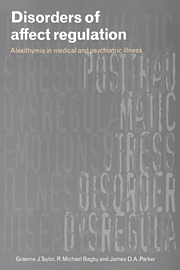Book contents
- Frontmatter
- Contents
- Foreword
- Acknowledgments
- Acknowledgment of permission for use of material
- Introduction
- 1 The development and regulation of affects
- 2 Affect dysregulation and alexithymia
- 3 Measurement and validation of the alexithymia construct
- 4 Relations between alexithymia, personality, and affects
- 5 The neurobiology of emotion, affect regulation, and alexithymia
- 6 Somatoform disorders
- 7 Anxiety and depressive disorders and a note on personality disorders
- 8 Substance use disorders
- 9 Eating disorders
- 10 Affects and alexithymia in medical illness and disease
- 11 Treatment considerations
- 12 Future directions
- Appendix
- References
- Index
Introduction
Published online by Cambridge University Press: 21 September 2009
- Frontmatter
- Contents
- Foreword
- Acknowledgments
- Acknowledgment of permission for use of material
- Introduction
- 1 The development and regulation of affects
- 2 Affect dysregulation and alexithymia
- 3 Measurement and validation of the alexithymia construct
- 4 Relations between alexithymia, personality, and affects
- 5 The neurobiology of emotion, affect regulation, and alexithymia
- 6 Somatoform disorders
- 7 Anxiety and depressive disorders and a note on personality disorders
- 8 Substance use disorders
- 9 Eating disorders
- 10 Affects and alexithymia in medical illness and disease
- 11 Treatment considerations
- 12 Future directions
- Appendix
- References
- Index
Summary
a deep concern with either mind or body or both appears historically to lead to concern with affect.
Silvan Tomkins, 1981Over the past two decades, there has been an expanding scientific interest both in the development and regulation of affects, and in the impact of dysregulated affects on mental and physical health. This interest in affects has been prompted by the development of new technologies and experimental methods for investigating brain functions, and by fascinating findings from observational studies of the infant–caregiver relationship. While the former have advanced our understanding of the brain mechanisms involved in emotions, the latter have led to reformulations of the nature, functions, and early development of affects that have important clinical implications. At the same time, the development of new measurement instruments has enabled researcher–clinicians to investigate temperamental or dispositional differences in affectivity, and to conduct empirical studies to explore the role of dysregulated affects in a variety of medical and psychiatric illnesses. Indeed, the study of affects has become an exciting interdisciplinary activity involving developmental psychology, personality psychology, neurobiology, psychoanalysis, biological psychiatry, psychophysiology, psychosomatic medicine, and the communication sciences.
The aim of this book is to show how some of the theoretical models and research resulting from this interdisciplinary activity provide a new clinical perspective from which certain medical and psychiatric illnesses can be reconceptualized as disorders of affect regulation.
- Type
- Chapter
- Information
- Disorders of Affect RegulationAlexithymia in Medical and Psychiatric Illness, pp. 1 - 6Publisher: Cambridge University PressPrint publication year: 1997
- 1
- Cited by



